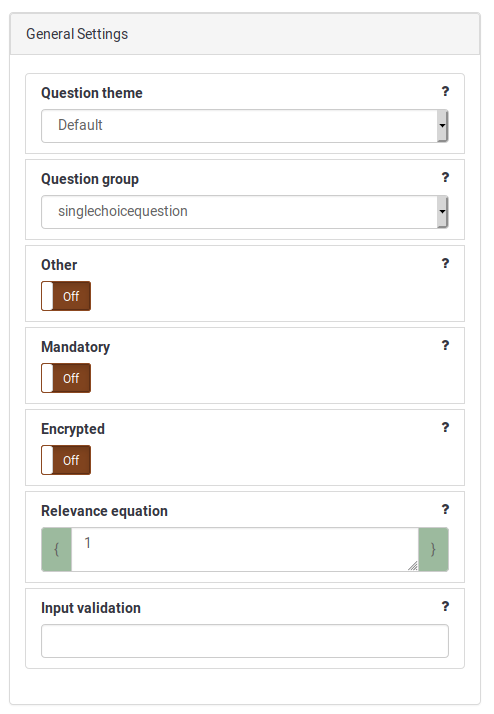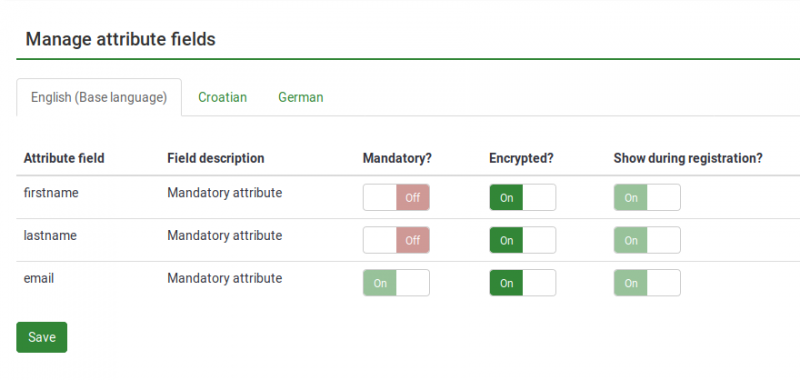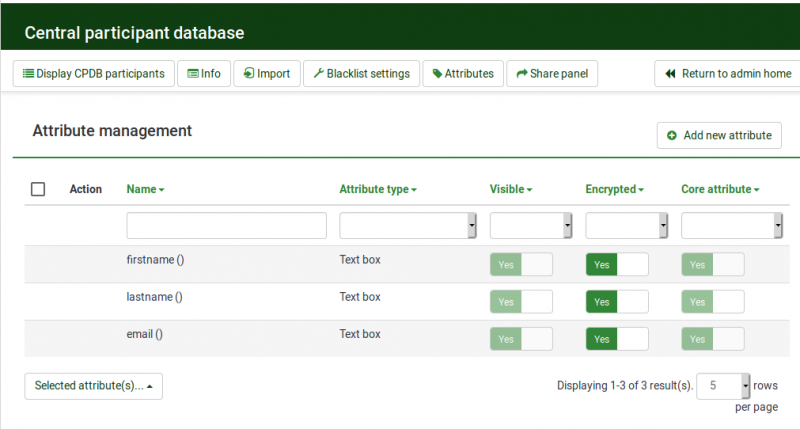Data encryption/da: Difference between revisions
From LimeSurvey Manual
Maren.fritz (talk | contribs) (Created page with "{{Alert|Når du har oprettet krypteringsnøgler, skal du sørge for at oprette sikkerhedskopier. Hvis du mister nøglerne, bliver dataene ubrugelige, da de ikke længere kan g...") |
Maren.fritz (talk | contribs) (Created page with "===Hvornår skal du kryptere dine data?===") |
||
| Line 19: | Line 19: | ||
{{Bemærk|Du kan flytte [[Optional_settings#Encryption_settings_.28New_in_4.0.0_.29|disse indstillinger]] i <code>application/config/config.php</code> efter installationen.}} | {{Bemærk|Du kan flytte [[Optional_settings#Encryption_settings_.28New_in_4.0.0_.29|disse indstillinger]] i <code>application/config/config.php</code> efter installationen.}} | ||
=== | ===Hvornår skal du kryptere dine data?=== | ||
Der er ikke ét rigtigt svar på dette spørgsmål. Det afhænger meget af: | |||
*the type of data you collect | *the type of data you collect | ||
Revision as of 14:12, 29 December 2023
Introduktion
Datakryptering er en ny funktion i LimeSurvey 4. Den er blevet oprettet for at hjælpe undersøgelsesadministratorer med bedre at håndtere de nye databeskyttelsesforskrifter, der er vedtaget i forskellige dele af verden (f.eks. GDPR).
Denne funktion tillader kryptering af personlige data placeret i central deltagerdatabase og/eller undersøgelsesdeltagertabellen. Desuden kan du også kryptere de data, du indsamler fra dine respondenter, hvis encryption question attribute er aktiveret.
Bemærk venligst, at dine data altid vil være synlige i LimeSurvey-grænsefladen. Kun databaseposterne bliver krypteret - ingen, der får adgang til serveren, hvor du hoster LimeSurvey, kan visualisere de respektive data. Vær derfor opmærksom på, hvem du giver globale tilladelser og undersøgelsestilladelser.
Hvornår skal du kryptere dine data?
Der er ikke ét rigtigt svar på dette spørgsmål. Det afhænger meget af:
- the type of data you collect
- where your survey is based on
- national or federal legislation
Most of the time, it is important to encrypt personally identifiable data (e.g., as it is recommended in the General Data Protection Regulation). Therefore, fields such as first name, last name, email address, phone number, address, and so on can be used to identify the responses one person submitted.
In other cases, the data that should be encrypted does not necessarily stop at the examples provided above. In certain scenarios (e.g., in medical research), you might need to encrypt most of your data if you can track back the responses to the person who submitted them.
As a result, please adapt your survey and the data collection to the local legislation!
Settings
There are three places in LimeSurvey where data encryption settings can be set:
Question attributes
Question attribute "Encrypted" is used to enable data encryption for corresponding responses. This attribute is turned off by default. Once survey is activated, it is not possible to change this attribute.

Participant attributes
Three core attributes (firstname, lastname, and email) are always shown in the survey participants table, the encryption being turned on by default.
Each new participant attribute will have encryption turned off by default.
Encryption can be turned on or off at any moment.

Central participant database attribute management
Three core attributes (firstname, lastname and email) are always shown in the central participant database, the encryption being turned on by default.
Each new participant attribute will have encryption turned off by default.
Encryption can be turned on or off at any moment.

Advanced
Sodium library is used to provide data encryption and decryption functionality for LimeSurvey.
Sodium is a modern, easy-to-use software library for encryption, decryption, signatures, password hashing and more. It is a portable, cross-compilable, installable, packageable fork of NaCl, with a compatible API, and an extended API to improve usability even further. Its goal is to provide all of the core operations needed to build higher-level cryptographic tools.
Sodium is cross-platforms and cross-languages. It runs on a variety of compilers and operating systems, including Windows (with MinGW or Visual Studio, x86 and x86_64), iOS and Android. Javascript and WebAssembly versions are also available and are fully supported. Bindings for all common programming languages are available and well-supported.
Version 7.2.0 and newer of the PHP programming language includes the Sodium extension (referred to as ext/sodium) as a core cryptography library. Version 2 of the PHP extension in PECL is compatible with ext/sodium in PHP 7.2.
LimeSurvey uses the Sodium Compat library to bridge with different PHP versions.
This library tentatively supports PHP 5.2.4 - 7.x (latest), but officially it only supports non-EOL'd versions of PHP.
Data encryption/decryption methods used in LimeSurvey are based on public-key signatures. Public and secret keys can be found in /application/config/security.php file. Keys are automatically generated on first usage of encryption feature.
Partial string search won't be possible for database columns with encrypted data, only exact match search.
Errors
Possible errors when using data encryption:
- library doesn't exists: PHP Sodium library have to be installed to be able to use data encryption feature. Here is a guide on how to install library: Sodium installation. If you don't want to use data encryption, you have to disable encryption in attribute settings.
- wrong decryption key: decryption key has changed since data was last saved, so data can't be decrypted. The only way to decrypt data is to retrieve the original key from backup and replace the current decryption key with the original key.
Note: if the wrong decryption key error happens only when LimeSurvey sends an email (e.g. when you concluded a survey), go in Configuration > Global Settings > E-mail settings, and re-insert your STMP password and press Save.[1]
Otherwise, you can still try to compare and eventually recover your decryption keys from a backup (since you do backups... isn't it? Uh?).